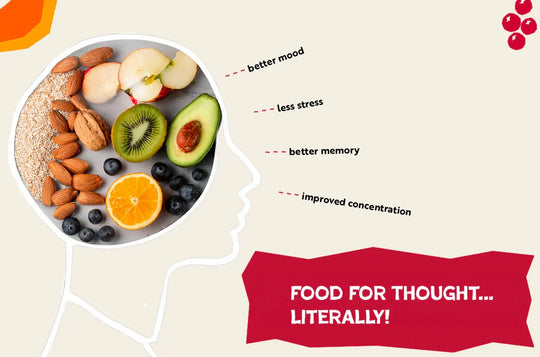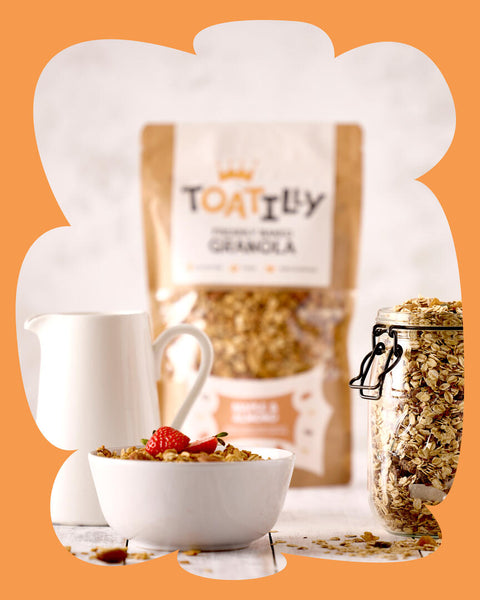Food For Thought… Literally!
Rachel Dalton-Thorpe
With Mental Health Awareness Week taking place from 12th - 18th 2025, we thought we’d discuss how breakfast can affect your mood and mental well-being.
Breakfast Is More Than Just Morning Fuel
Eating breakfast indeed helps fuel your body for the day ahead, but it does much more than that. What you eat in the morning can directly affect your mood, focus, mental clarity and long-term mental health.
Still think skipping breakfast is worth it to save a bit of time???
Let’s take a look at the science-backed links between breakfast and brain health. We will share our thoughts on the psychology of eating in the morning and give you some mood-boosting breakfast options that not only taste great but can help you feel more balanced and energised.
The Brain–Breakfast Connection: Why It Matters
We know our bodies need food to help us function and give us energy, but what about our brains?

Does Your Brain Really Need Breakfast?
Your brain really does benefit from breakfast. After a good night’s sleep, your body’s energy stores are low, as you haven’t eaten for several hours. Glucose, which comes from the food you eat, is the main source of fuel for the brain.
Research suggests that having breakfast can support cognitive tasks such as concentration and attention. This applies to both children and adults. Just as you wouldn’t send a child to school without breakfast, it’s important to fuel your own body and brain before starting the day.
Skipping breakfast can leave you running low on energy, like trying to drive with the fuel light on. You might get through the morning, but it could feel harder than it needs to.
Breakfast and Mental Health: What the Science Says
Let's give you some more examples of how recent scientific studies have made a direct link between breakfast and mental health.
Can Eating Breakfast Help Mental Health?
Yes, and there is an increasing number of studies proving it.
A 2010 paper in Appetite found that individuals who regularly ate breakfast reported lower levels of depression and stress compared to those who skipped it. Another study about Physiology & Behaviour showed a link between eating a balanced breakfast and improved emotional regulation.
What Does Skipping Breakfast Do to the Brain?
If you choose to skip breakfast, it can cause your blood sugar levels to drop. This can trigger irritability, anxiety and poor concentration. If you skip breakfast for a long period of time, it has been associated with increased risk of depression, particularly in teens and young adults.
What About Intermittent Fasting?
Intermittent fasting can have some positive effects on your metabolism, but its effects on your mental health are more complex.
A 2022 review in Nutrients acknowledged potential benefits but also noted that skipping breakfast could impair short-term cognitive performance. The effects were increased in women and younger individuals.
If you’re considering fasting, intermittent it is worth experimenting with and seeing how it affects your mood, focus and emotional stability. If you see a negative impact, stop!
What Makes a Good “Mental Health Breakfast”?
Not all breakfasts are created equal. A sugary pastry will probably satisfy your sweet tooth, but it's not going to do any long-term favours for your brain.

To fuel your mind and mood effectively, your breakfast should include:
-
Complex carbohydrates – for slow, sustained energy
-
Protein – to stabilise blood sugar and support neurotransmitter production
-
Healthy Fats – like chia seeds, to support brain cell structure
-
Micronutrients – particularly B-vitamins, iron, magnesium, and zinc
The British Journal of Nutrition found that a breakfast rich in low-GI carbohydrates and fibre leads to improved mood and alertness throughout the morning.
Real People, Real Results
Our friend's 21-year-old daughter, who is currently at uni, more often than not would skip breakfast completely. She found that by the afternoon, it was hard to concentrate on her studies, and she was getting increasingly irritable with her flatmates.
After explaining how important breakfast was and how it could help, she started eating breakfast more regularly.
“I didn’t realise how much missing breakfast was affecting my mood,” Amy says. “Now, I try to eat breakfast everyday and I feel more focused and happier.”
Amy’s story isn’t unique. Across the UK, more and more people are waking up to the mental health benefits of starting their day with something truly nourishing.
Mood-Boosting Breakfast Ideas

Now you've heard the science behind the idea, let's get into some mood-boosting breakfast options. Built to keep your brain firing on all cylinders:
1 - Porridge with Berries and Chia Seeds
-
Benefits: Oats are rich in slow-digesting carbs and B-vitamins. Berries bring antioxidants, and chia seeds offer omega-3s for brain health.
Use Toatilly’s Buckwheat & Blueberry porridge as a warm porridge base.
2 - Overnight Oats with Banana and Walnuts
-
Benefits: Oats help stabilise blood sugar, bananas provide mood-regulating tryptophan, and walnuts deliver omega-3s and magnesium. Both of which are linked to lower anxiety.
Use Toatilly’s Suffolk blend porridge soaked overnight in almond milk for a creamy, satisfying start to your day.
3 - Muesli Bowl with Greek Yoghurt, Honey, and Pumpkin Seeds
-
Benefits: Muesli provides sustained energy, honey offers a gentle sugar boost, and pumpkin seeds are packed with zinc, known to support brain function.
Serve Toatilly’s Bircher Muesli with thick yoghurt, a drizzle of raw honey, and a handful of toasted pumpkin seeds.
4 - Warm Apple Cinnamon Porridge
-
Benefits: Apples offer fibre and flavonoids, and cinnamon helps regulate blood sugar. Warm meals are also comforting to the nervous system.
Use Toatilly’s Apple & Cinnamon porridge mix and top with stewed apples and a sprinkle of flaxseed.
Practical Tips to Build a Brain-Boosting Breakfast Habit
-
Start small: Even a banana with some nut butter is better than nothing.
-
Prep ahead: Use overnight oats or smoothie packs to reduce morning stress.
-
Set a reminder: Eating within 1–2 hours of waking up supports your natural cortisol rhythms.
- Listen to your body: Pay attention to how you feel mid-morning after breakfast vs. when you have skipped it.
Your Ally in the Breakfast–Brain Battle

We know that starting your day right can sometimes feel like a chore. That’s why Toatilly’s range of oat-based breakfasts is designed not just for convenience, but for your mental wellbeing.
Our blends are:
-
High in fibre – for digestive and mood regulation
-
Naturally sweetened – no sugar crashes
-
Packed with adaptogens and superfoods – like cacao for natural energy and stress resilience
So whether you’re powering through a workday, tackling university lectures, or just trying to keep it together on the school run, we’ve got you covered.
Making Your Morning Meal Matter
Breakfast isn’t just the start of your day. It’s the start of your mental and emotional rhythm. The science is clear: eating a healthy breakfast can significantly support your mood, memory, concentration and even reduce the risk of mental health issues.
Breakfast time is also a great time to share a morning meal with family, friends or even work colleagues. Sitting down to eat together can help create a supportive network and even uplift your spirit, even when you are having a down day.
Bringing Your Community Together
This year's Mental Health Awareness Week is all about the power of community. So why not share your breakfast with yours and see if it brightens up your day?

We love our Toatilly community, and we would love to see you enjoying your brain-busting breakfasts with the people you care about. Share your pictures online, tag us @toatilly and connect with other oat-loving people. Let's make your supportive community bigger!!!

Buy Your Brain Busting Breakfasts Now!
Explore our delicious range of oat-based breakfasts and experience the true meaning of food for thought.
Health References
- https://pubmed.ncbi.nlm.nih.gov/10367010/
- https://pubmed.ncbi.nlm.nih.gov/2223932/
- https://www.cambridge.org/core/journals/public-health-nutrition/article/goodquality-breakfast-is-associated-with-better-mental-health-in-adolescence/BC73699BE949DC70BB1727831CC58CC2
- https://www.thelancet.com/journals/eclinm/article/PIIS2589-5370(24)00098-1/fulltext
- https://www.researchgate.net/publication/51474577_Glycaemic_index_and_glycaemic_load_of_breakfast_predict_cognitive_function_and_mood_in_school_children_A_randomised_controlled_trial
Share
